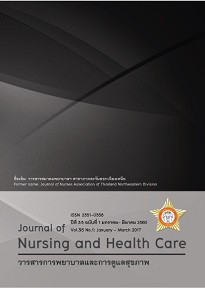ผลของโปรแกรมสนับสนุนครอบครัวสำหรับครอบครัวผู้ติดสารเสพติด ในโรงพยาบาลธัญญารักษ์อุดรธานี The Effectiveness of Family Support Program for Families of Substance Users : Thanyarak Udonthani Hospital
คำสำคัญ:
โปรแกรมครอบครัวบำบัด, ครอบครัวผู้ติดยาและสารเสพติด, ยาและสารเสพติด Programs of family therapy, family of drug and substance abuse, drug and substance abuse.บทคัดย่อ
บทคัดย่อ
การวิจัยกึ่งทดลองนี้มุ่งศึกษาผลของโปรแกรมกลุ่มสนับสนุนครอบครัวสำหรับสมาชิกครอบครัวผู้ใช้สารเสพติดโรงพยาบาลธัญญารักษ์อุดรธานี ที่มุ่งเน้นการสนับสนุนและช่วยเหลือสมาชิกครอบครัวที่เป็นผู้ดูแลผู้ติดสารเสพติด โดยเปรียบเทียบผลการศึกษาในเรื่อง ภาวะสุขภาพ คุณภาพชีวิต ทัศนคติต่อผู้ใช้สารเสพติด และการทำหน้าที่ของครอบครัว ภายในและระหว่างกลุ่มทดลองและกลุ่มควบคุม กลุ่มตัวอย่างเป็นอาสาสมัครที่เป็นสมาชิกครอบครัวและเป็นผู้ดูแลผู้ติดสารเสพติด ที่เข้ารับการรักษาที่โรงพยาบาลธัญญารักษ์อุดรธานี จำนวน 60 คน กลุ่มตัวอย่างจะถูกสุ่มเข้ากลุ่มทดลองและกลุ่มควบคุม กลุ่มละ 30 คน ในระยะของการดำเนินการวิจัยพบว่า มีกลุ่มตัวอย่างบางคนถอนตัวออกจากการวิจัย คงเหลือกลุ่มทดลอง 24คน และกลุ่มควบคุม 26 คน โดยกลุ่มทดลองได้เข้าร่วมโปรแกรม Modified Thai Family Support (M-TFS) ส่วนกลุ่มควบคุมได้รับการดูแลตามมาตรฐานของโรงพยาบาลธัญญารักษ์อุดรธานี (Standard Care) การประเมินประสิทธิผลของโปรแกรมมีการวัด 3 ครั้ง คือก่อนการทดลอง หลังการทดลองและติดตามผลหลังการทดลอง 1 เดือน เครื่องมือที่ใช้ในการวิจัย ได้แก่ โปรแกรม M-TFS และแบบประเมินประสิทธิภาพของโปรแกรม ประกอบด้วย แบบประเมินภาวะสุขภาพ แบบประเมินคุณภาพชีวิต แบบวัดทัศนคติต่อผู้ใช้สารเสพติด แบบประเมินการทำหน้าที่ของครอบครัว และคำถามเชิงโครงสร้าง เก็บข้อมูลวิเคราะห์ข้อมูลด้วยสถิติพรรณนา ได้แก่ ความถี่ ร้อยละ ค่าเฉลี่ย ส่วนเบี่ยงเบนมาตรฐาน ทดสอบสมมติฐานด้วยสถิติ Chi square และ Repeated Measures ANOVA ผลการวิจัย พบว่า
1. ค่าเฉลี่ยคะแนนภาวะสุขภาพ ภายในกลุ่มทดลองและกลุ่มควบคุม ก่อนการทดลอง ภายหลังการทดลองและระยะติดตามผล มีความแตกต่างกันอย่างมีนัยสำคัญทางสถิติ F = 24.29, p < .001 ขนาดอิทธิพล (Effect size) มีค่าเท่ากับ 0.29
2. ค่าเฉลี่ยคะแนนคุณภาพชีวิต ภายในกลุ่มทดลองและกลุ่มควบคุม ก่อนการทดลอง ภายหลังการทดลองและระยะติดตามผล มีความแตกต่างกันอย่างมีนัยสำคัญทางสถิติ F = 23.09, p < 001ขนาดอิทธิพล (Effect size) มีค่าเท่ากับ 0.29
3. ค่าเฉลี่ยคะแนนทัศนคติต่อผู้ใช้สารเสพติด ภายในกลุ่มทดลองและกลุ่มควบคุม ก่อนการทดลอง ภายหลังการทดลองและระยะติดตามผล มีความแตกต่างกันอย่างมีนัยสำคัญทางสถิติ F = 24.21, p < .001 ขนาดอิทธิพล (Effect size) มีค่าเท่ากับ 0.34
4. ค่าเฉลี่ยคะแนนการทำหน้าที่ของครอบครัว ภายในกลุ่มทดลองและกลุ่มควบคุม ก่อนการทดลอง ภายหลังการทดลองและระยะติดตามผล มีความแตกต่างกันอย่างมีนัยสำคัญทางสถิติ F = 25.17, p < .001 ขนาดอิทธิพล (Effect size) มีค่าเท่ากับ 0.30
โปรแกรม Modified Thai Family Support (M-TFS) มีความเหมาะสม เพื่อช่วยเหลือสมาชิกครอบครัวที่เป็นผู้ดูแลผู้ติดสารเสพติด ควรมีการเผยแพร่ผลงานแก่บุคลากรสาธารณสุขที่ดูแลงานด้านยาเสพติดในรูปแบบชุดโปรแกรม และพัฒนาเป็นหลักสูตรการฝึกอบรมสำหรับโรงพยาบาลธัญญารักษ์อื่นๆ หรือโรงพยาบาลที่มีลักษณะใกล้เคียงกันต่อไป
Abstract
This quasi-experimental study investigated the effects of a family support program on family members of illicit drug users (IDUs) in terms of family members’ health status, quality of life, attitude towards IDUs and family functioning. Study participants were 60 family members of IDUs receiving treatment at Thanyarak Udonthani Hospital. IDUs family members were randomly assigned to either the experimental or comparison group to form a group of 30 participants before the implementation of the family support program. During the intervention, some participants dropped out from the study, resulting 26 cases completed the treatment and 24 cases completed control condition. Participants engaged into the treatment condition received intervention, called the Modified Thai Family Support (M-TFS) whereas people in control trial were treated as usual, using standard care. Participants were assessed at 3 times; baseline, post intervention, and 1 month after intervention completion. Instruments of this study included The M-TFS, GHQ-28 questionnaires, WHOQOL-BREF-THAI, FAS, and FFS. Semi-structure interview was also used. Data analyses were undertaken to obtain frequencies, percentages, means and standard deviations. Chi-square statistics and repeated measures ANOVA were performed for hypotheses testing.
Results indicated the followings.
1. Mean health status scores between the two groups before and after program implementation, and at follow-up period were statistically significantly different (F = 24.29, p < .001) with the effect size of 0.29.
2. Mean quality of life scores within the experimental and comparison groups before and after program implementation, and at follow-up period were statistically significantly different (F = 23.09, p < .001) with the effect size of 0.29.
3. Mean attitude towards IDUs scores within the experimental and comparison groups before and after program implementation, and at follow-up period were statistically significantly different (F = 24.21, p<.001) with the effect size of 0.34.
4. Mean family functioning scores within the experimental and comparison groups before and after program implementation, and at follow-up period were statistically significantly different (F = 25.17, p < .001) with the effect size of 0.30. The M-TFS was suitable to support family members of substance users. This program should be promoted to health professional, working in drug addiction field. The training for staff in other Thanyaruk hospitals or similar context is required.



